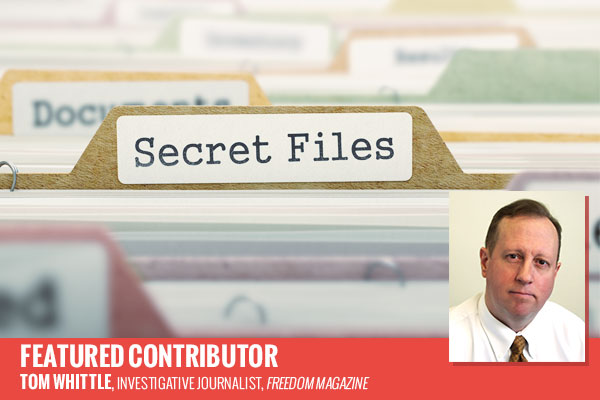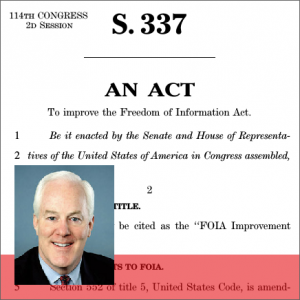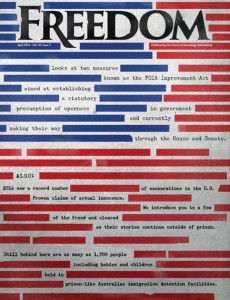
Secular And Religious Leaders Support A More Open Government – The Importance of FOIA and the Freedom of Information Act
- By Tom Whittle --
- 13 Jun 2016 --

Congress sends Landmark Freedom of Information Bill to President Obama.
June 13 marked an auspicious advance in the history of freedom of information—and a reversal of the trend that in recent years has seen access to information in government files become more and more problematic for the average citizen or journalist.
Secular And Religious Leaders Support A More Open Government[/tweetthis]
By unanimous vote, the U.S. House of Representatives passed a bill to bolster citizens’ right to know what their government does and what their tax dollars pay for.
 The new measure, introduced by Senator John Cornyn and known as the FOIA Improvement Act of 2016, was approved by the Senate in March. These much-needed bipartisan reforms to the Freedom of Information Act (FOIA) will now go to President Barack Obama’s desk for signature just days before transparency advocates celebrate the 50th anniversary of the signing of the original FOIA into law on July 4, 1966. Insiders expect it to be rapidly signed by the President so that the FOIA is “fixed by 50,” the slogan of FOIA reformers who pushed for passage of this act.
The new measure, introduced by Senator John Cornyn and known as the FOIA Improvement Act of 2016, was approved by the Senate in March. These much-needed bipartisan reforms to the Freedom of Information Act (FOIA) will now go to President Barack Obama’s desk for signature just days before transparency advocates celebrate the 50th anniversary of the signing of the original FOIA into law on July 4, 1966. Insiders expect it to be rapidly signed by the President so that the FOIA is “fixed by 50,” the slogan of FOIA reformers who pushed for passage of this act.
The new bill was supported by a group of religious and secular leaders in a joint letter to Congress, urging passage of the measure. Groups including the Church of Scientology, the Center for Pluralism, the Center for Inquiry, and the Federation of Indian American Christian Organizations urged Congress to ensure this bill reached the President’s desk in support of their work for social justice and human rights.
As summarized by Congressional Research Service (CRS) and NGOs leading the movement for more transparency in government through FOIA reform, the measure brings changes that include:
- Limiting the ability of agencies to keep internal deliberations confidential to a period of 25 years. Agencies would lose the ability to cite Exemption 5 (protecting internal deliberations) in denying requests if the information is more than 25 years old. This will allow historians and others to have a more complete picture of the making of important government policy throughout the country’s history;
- Requiring agencies to make disclosable records and documents available to the public in an electronic format;
- Requiring agencies to make “frequently requested records”—records that have been asked for three or more times—similarly available in an electronic format;
- More firmly establishing a “presumption of openness” that prohibits agencies from withholding records “unless the agency reasonably foresees that disclosure would harm an interest protected by a FOIA exemption or disclosure is prohibited by law.”
The measure mandates that the Office of Government Information Services (OGIS) provide mediation services to help settle disputes between requesters and agencies. It expands the role and authority of each agency’s Chief FOIA Officer and establishes a Chief FOIA Officers Council “to develop recommendations for increasing compliance and efficiency in responding to FOIA requests, disseminating information about agency experiences, identifying, developing, and coordinating initiatives to increase transparency and compliance, and promoting performance measures to ensure agency compliance with FOIA requirements,” according to the CRS summary.
And it lessens potential confusion for requesters by directing the Office of Management and Budget to make certain the public is able to request records from any agency from a single, consolidated website.
The Church of Scientology has been a consistent advocate of open government and strong freedom of information laws in the United States and abroad, and has helped to bring such laws into being in Australia, Canada, France, Germany, New Zealand, the United Kingdom and other lands. Over the decades, the Church and its magazine devoted to investigative reporting, Freedom, have utilized freedom of information laws to bring to the surface a broad range of information in the public interest.
 To make the provisions of the Freedom of Information Act broadly known and to promote its use, the Church and Freedom prepared and published manuals on how to use the act in 1976, 1979 and again in 1989.
To make the provisions of the Freedom of Information Act broadly known and to promote its use, the Church and Freedom prepared and published manuals on how to use the act in 1976, 1979 and again in 1989.
In 1992, Freedom presented the man known as the father of the Freedom of Information Act, U.S. Congressman John Moss, with its Human Rights Leadership Award in recognition of his extensive work to bring about passage of the original FOIA in 1966.
The new measure reflects the spirit of his words: “The real security of a nation is the intelligence and understanding of its people. Every effort should be made by government—the servant and not the master—to assure that maximum information be available to the people who are the ultimate power under the Constitution. No agency, no department, no individual has demonstrated a need so great as to avoid accountability for actions taken—for decisions made.”


















